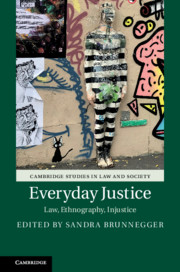Book contents
- Everyday Justice
- Cambridge Studies in Law and Society
- Everyday Justice
- Copyright page
- Contents
- Contributors
- Acknowledgments
- Chapter One Theorizing Everyday Justice
- Part One Im/possibilities of Everyday Justice
- Part Two The Force of Everyday Justice
- Part Three Everyday Justice Unbound
- Afterword
- Index
- Cambridge Studies in Law and Society
- References
Afterword
Published online by Cambridge University Press: 28 November 2019
- Everyday Justice
- Cambridge Studies in Law and Society
- Everyday Justice
- Copyright page
- Contents
- Contributors
- Acknowledgments
- Chapter One Theorizing Everyday Justice
- Part One Im/possibilities of Everyday Justice
- Part Two The Force of Everyday Justice
- Part Three Everyday Justice Unbound
- Afterword
- Index
- Cambridge Studies in Law and Society
- References
Summary
The chapter offers reflections on the theme of everyday justice as pursued in the volume, emphasizing the contributors’ challenges to deeply embedded legalisms in the ethnography of law. Themes include states as social facts, transitional justice and humanitarianism, privatization and its forms of contractual citizenship, and their various implications for ethnographic understandings of political agency, consciousness, and temporality. Throughout, everyday justice is presented as not only integral to consciousness but also – borrowing from Hannah Arendt – its active principle.
- Type
- Chapter
- Information
- Everyday JusticeLaw, Ethnography, Injustice, pp. 206 - 217Publisher: Cambridge University PressPrint publication year: 2019
References
- 1
- Cited by

